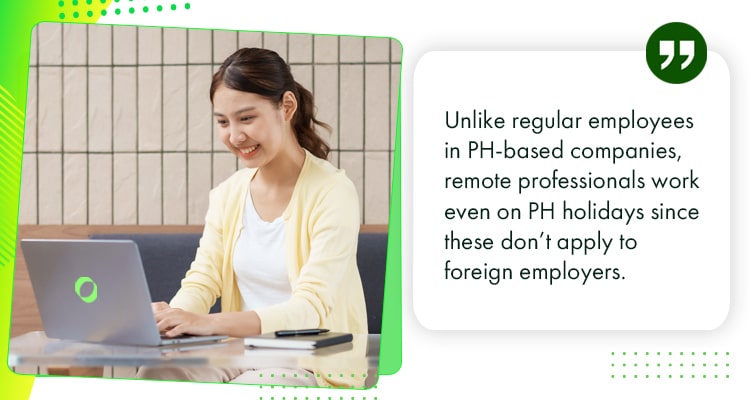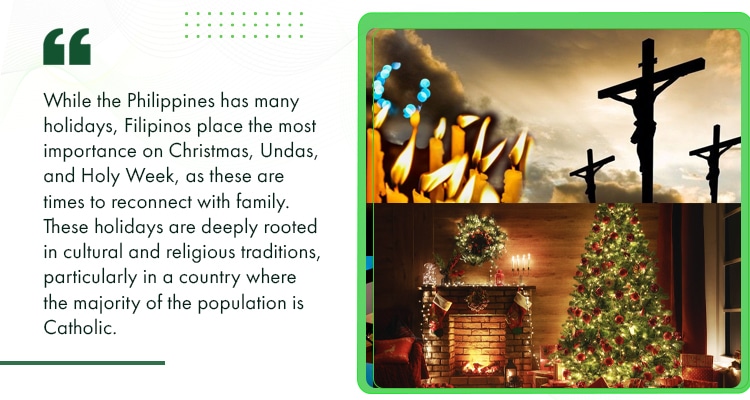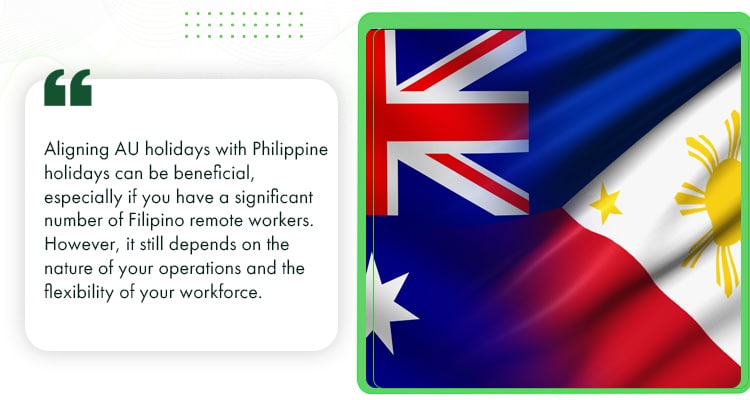The Philippines is known worldwide for providing top-notch services in customer support, virtual assistance, IT, creative design, and content creation.
Thanks to technology, Filipino workers can work for just about anyone all over the world. In fact, many AU business owners and entrepreneurs hire skilled Filipino remote workers for their strong work ethic, excellent English language skills, and diverse abilities.
With the growing number of Filipino remote teams, it’s essential to understand the cultural dynamics within these teams. A key starting point is recognising and celebrating Philippine holidays (whenever the workload allows), which helps foster loyalty and good will.
Let’s dive in.
Why Holidays Matter in a Remote Setting
Recognising key holidays acknowledges diverse backgrounds and promotes inclusivity, especially if you’re managing a fully remote team.
For example, if you have Filipino remote workers, granting them paid leaves during important Philippine holidays would be a thoughtful gesture, showing respect for their culture and traditions.
Overview of Philippine Public Holidays
The Philippines observes numerous public holidays that reflect its rich history, culture, and traditions. These holidays are classified into two categories:
- Regular Holidays – These are widely celebrated across the country; and
- Special Non-Working Days – These vary in significance and observance depending on the region.
As a predominantly Catholic nation, many Philippine holidays align with Christian traditions, such as Christmas and Holy Week, which hold tremendous significance in a country that holds both family and faith sacred. These holidays are often deeply rooted in religious practices and provide opportunities for reflection, prayer, and family gatherings.

Moreover, some holidays celebrate historical milestones and national pride, like Independence Day and Heroes’ Day.
Why Some Holiday Observances Vary
In general, most holidays occur on the same date every year.
However, the Philippine government sometimes adjusts holiday dates through proclamations to create long weekends. This practice, known as “holiday economics,” encourages domestic travel and helps boost the economy.
Additionally, some Filipino holidays are specific to certain regions or communities, reflecting the country’s diverse customs and historical influences.
For example, festivals honoring local patron saints or commemorating significant regional events may result in localised holiday declarations, rather than nationwide observance.
2025 Philippine Holidays That May Impact Productivity
Unlike regular employees in PH-based companies, remote professionals work even on PH holidays since these don’t apply to foreign employers.
As a result, some end up applying their paid leaves or even requesting unpaid leaves just to observe certain holidays.
Major Holidays
Some holidays have more cultural, religious, and familial significance than others, and these are typically widely observed throughout the country (and in most parts of the world):
Holy Week
Being a predominantly Catholic country, Holy Week (the week immediately preceding Easter) is particularly sacred to Filipinos. This period commemorates the passion, death, and resurrection of Jesus Christ and is a time for solemn rituals like processions, reenactments of the crucifixion, and prayerful reflection.

Many workers also use this period to travel to their hometowns, participate in religious activities, or enjoy a vacation, especially with the extended weekend.
In 2025, Holy Week will fall on April 13-20, spanning Palm Sunday to Easter Sunday. During this week, Maundy Thursday and Good Friday are considered public holidays.
Locally, business operations may slow down as employees prioritise family time, church traditions, or spiritual retreats.
Meanwhile, remote workers with foreign employers remain online for work. However, they face the challenge of balancing their work duties with the desire to participate in religious traditions.
Thus, a number of AU entrepreneurs allow them to take some time off especially since Australia also observes Good Friday.
Undas
In the Philippines, Undas, or All Saints’ Day and All Souls’ Day, observed on November 1 and 2, holds a deep cultural and spiritual significance.
These days are dedicated to honouring departed loved ones, with families visiting cemeteries to clean graves, light candles, and offer prayers. It’s also a time for reunions, often accompanied by large family gatherings and shared meals.
Most businesses are closed during these days because employees travel to their home provinces. Some remote workers remain online but some may request time off to pay their respects.
Christmas Season
Filipinos also place significant importance on the Christmas Season, particularly the period from December 16-31.
Christmas Eve and Christmas Day are public holidays in the Philippines (and in many places the world over), and many workers extend their breaks to spend quality time with family and participate in religious and social activities.
Moreover, the lead-up to Christmas is filled with reunions and family gatherings. For many, this holiday season means traveling to their home provinces to spend quality time with relatives they haven’t seen all year.
Thus, many Aussie employers offer Filipino remote workers flexible schedules or paid time-off during this time, especially since Australia also observes holidays like Christmas Day (25 Dec), Boxing Day (26 Dec), and New Year (1 January).
Other Holidays
The Philippines also have several notable holidays aside from Christmas, Holy Week, and Undas, though these aren’t nearly as significant, such as:
- April 19, Araw ng Kagitingan (Day of Valor) – This holiday honours Filipino and American soldiers who fought during World War II, especially in the Battle of Bataan.
- May 1: Labour Day – Filipinos also observe Labour Day to celebrate workers’ contributions across all industries.
- June 12: Independence Day – This holiday marks the Philippines’ independence from Spanish colonial rule after 333 years and is celebrated with patriotic events and flag-raising ceremonies.
- August 25: National Heroes Day – Filipinos pay tribute to national heroes who fought for the country’s freedom and democracy.
- November 30: Bonifacio Day – This holiday honours Andres Bonifacio, a revolutionary leader and the Father of the Philippine Revolution.
- December 30: Rizal Day – This holiday commemorates the life and works of Dr. Jose Rizal, a Philippine national hero who was executed for advocating reforms during Spanish rule.
Do All Holidays Matter?
While the Philippines has many holidays, Filipinos place the most importance on Christmas, Undas, and Holy Week, as these are times to reconnect with family. These holidays are deeply rooted in cultural and religious traditions, particularly in a country where the majority of the population is Catholic.
Conversely, holidays like Independence Day, Labour Day, and Heroes’ Day also have historical significance, but most remote workers don’t mind working on these days (particularly if their clients are busy at this time), as they do not hold the same cultural or religious impact.

Thus, if you have Filipino workers on your team, it’s fine to skip minor holidays as long as you’re more flexible with important ones like Christmas, Undas, and Holy Week, which hold greater cultural and religious significance.
You may also want to consider allowing workers to submit work in advance or offering flexible schedules on these days, to ensure that operational needs are still met at this time.
Cultural Sensitivity Tips for Australian Employers
Understanding and respecting cultural differences is crucial for promoting inclusivity, better communication, and a harmonious workplace.
It also means avoiding stereotypes and creating policies that respect different traditions and practices.
Here are some tips to keep your business productive while respecting cultural differences within a remote team:
#1. Plan for Flexibility
Cultural sensitivity is a factor behind many successful diverse teams, ensuring smooth operations and better employee engagement.
In line with this, employers often adjust work schedules or tasks to honor important cultural observances like Christmas, Undas, and Holy Week. This may include:
- Offering leave options;
- Creating floating holidays (flexible paid days off); or
- Permitting alternative work hours.
#2. Celebrate Diversity
Employers can also organise virtual events, such as multicultural days for employees to share their traditions and stories.
These events create opportunities for both remote workers and their office-based counterparts to share cultures and build stronger connections.
Celebrating and embracing diversity fosters innovation, as employees from different backgrounds bring fresh perspectives and ideas. It also strengthens workplace cohesion, helping the company thrive in a competitive business environment.
#3. Leverage Technology
Thanks to technology, many communication platforms already have translation tools and multilingual chat options that minimise language barriers.

Moreover, virtual collaboration tools allow diverse teams to work seamlessly, regardless of location. They allow employees to work flexibly, enabling teams to maintain productivity while respecting cultural observances.
For example, remote workers can complete tasks in advance before their paid holiday leaves. This allows other employees to review their progress and refer to their work, ensuring continuity even if a team member is out of the office for the holidays.
How to Align Business Goals with Holiday Planning
Holiday planning is a strategic approach to maintaining productivity while respecting employee needs. Here’s how to do it effectively:
- Identify Critical Business Periods – Start by assessing your busy periods and identify which roles will need backup in case the employees occupying them request time off for holidays.
- Create a Holiday Calendar – Include holidays like Christmas and New Year. If you have Filipino remote workers, consider adding 3-4 days at most, for Undas AND Holy Week.
- Encourage Collaboration – Foster a culture where employees collaborate to balance workloads. For example, allow team members to voluntarily trade shifts or share responsibilities, helping reduce pressure during peak holiday times.
FAQs: Addressing Employer Concerns
Here are some frequently asked questions (FAQs) that Aussie employers often have about Philippine holidays:
#1. What Steps Can I Take to Ensure Minimal Disruption During Major Philippine Holidays?
Start by identifying the holidays most likely to impact your operations, i.e., Christmas season, Undas, and Holy Week, which are widely celebrated and observed by Filipino remote workers.
After that, communicate with your team well in advance, encouraging them to submit leave requests early so schedules can be adjusted accordingly.
In addition, cross-train employees for essential tasks, allowing flexibility if certain team members are unavailable.
#2. Can I Expect Remote Employees to Work on Local Holidays?
While some remote employees may agree to work on local holidays, employers need to approach this with a fair bit of consideration.
Hence, it’s best to discuss holiday policies during onboarding or contract negotiations to set clear expectations. Friendly advice: flexibility is key.
If you need them to work during local holidays like Undas, offer alternatives such as floating holidays or compensatory time off. This shows support for your remote workers and helps make it easier to attract and retain employees.
#3. Should I Consider Aligning Australian Holidays with Philippine Ones?
Aligning AU holidays with Philippine holidays can be beneficial, especially if you have a significant number of Filipino remote workers. However, it still depends on the nature of your operations and the flexibility of your workforce.
You don’t have to align the holidays for both countries. It’s enough to recognize the most important ones and/or whether you can offer paid time off or floating holidays for those.
Conclusion
Filipino teams are often the best-kept secret of many Western employers, including Australian business owners. They have a strong work ethic, English language fluency, and are known for going the extra mile to provide incredible service – to their employers and their employers’ customers alike.
More importantly, their dedication, ability to handle pressure, and loyalty make them a top choice for employers.

Offering flexibility for the most important Philippine holidays, which are only a few days a year, is a small price to pay for the immense value Filipino teams bring and the loyalty this can foster.
For more information about Filipino remote workers (and how they can help grow your business), request a call back now.
Tap world-class remote workers for your growing business this 2025. Click here.
If you’re ready to experience the full advantages of working with a top global team, check out our 1,000 fully vetted and highly talented staff here.
Syrine is studying law while working as a content writer. When she’s not writing or studying, she engages in tutoring, events planning, and social media browsing. In 2021, she published her book, Stellar Thoughts.




















